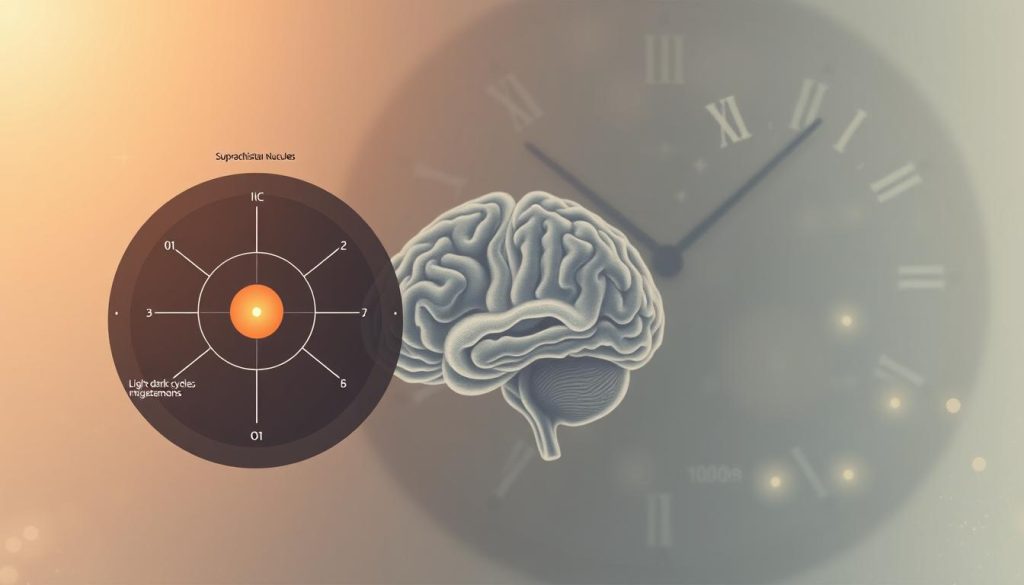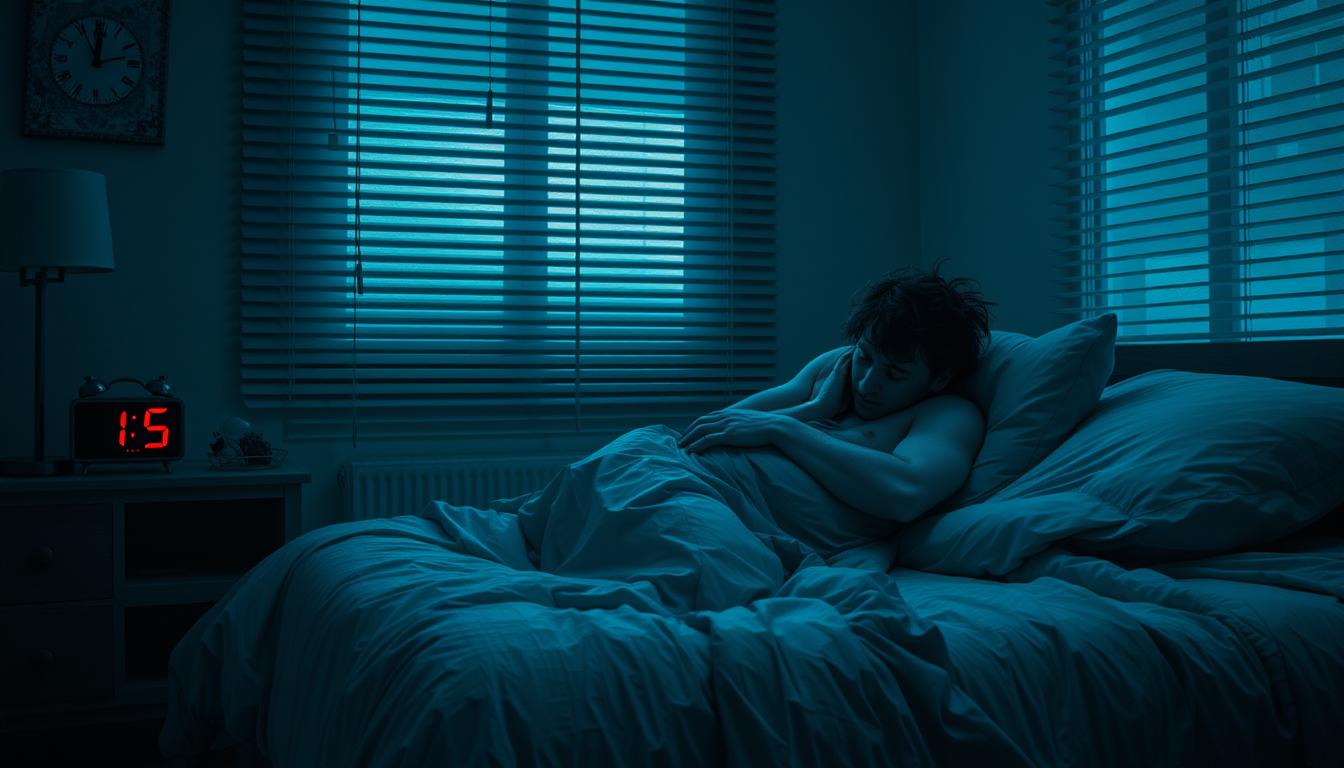In today’s world, millions of Americans unknowingly harm their health by messing with their sleep cycles. Our modern lifestyle often makes us work against our body’s natural rhythm. This leads to serious issues that go beyond just feeling tired.
When your body’s clock doesn’t match your daily life, it causes a lot of problems. This affects your immune system and your mind. You might feel a constant tiredness that’s not just normal.
If you work nights, travel a lot, or have irregular sleep, knowing these risks is key. The effects can harm your health in ways you might not see coming. Learning about these dangers is the first step to protecting yourself and your loved ones.
Understanding Circadian Rhythms
Your body has an internal 24-hour clock that controls more than sleep. It affects your energy and digestion. Disruptions can harm your health, including your immune system.
Modern life often messes with our natural rhythms. Artificial lights, shift work, and irregular schedules can upset our balance. Knowing how these rhythms work helps us make healthier choices.

What Are Circadian Rhythms?
Circadian rhythms are natural cycles that repeat every 24 hours. They control when you feel awake, tired, hungry, and more. These rhythms are found in almost all living things.
Your circadian system controls hormone releases. Melatonin helps you sleep, while cortisol wakes you up. Misalignment can lead to hormone imbalances that affect your body.
Think of your circadian rhythm as a conductor leading an orchestra. Each instrument must play at the right time for harmony. Similarly, your body’s processes must happen at the correct times for health.
The Biological Clock Explained
Your primary biological clock is in a small brain area called the suprachiasmatic nucleus. It has about 20,000 neurons that act as your body’s timekeeper. It gets light signals from your eyes and adjusts your clock.
This central clock sends timing signals to all your organs and tissues. Your liver, heart, kidneys, and skin have their own clocks. These follow the master clock, creating a synchronized system.
When your biological clock works right, it keeps your immune system healthy. But disruption can weaken your immune system, making you more prone to infections and inflammation.
Factors Influencing Circadian Rhythms
Light exposure is key to your circadian rhythms. Morning sunlight resets your clock. But, bright artificial light at night can confuse it and delay sleep.
Your eating schedule also affects your rhythms. Eating at regular times helps keep your clock in sync. Eating late can shift your clock and lead to metabolic problems.
Physical activity, social interactions, and room temperature also influence your rhythms. Consistent routines strengthen these cycles. But irregular schedules can cause chronic hormone imbalances and health problems.
Age affects circadian rhythms too. Older adults tend to go to bed and wake up earlier. Teenagers often prefer to stay up late and sleep in.
The Impact of Circadian Misalignment on Sleep
Circadian misalignment leads to a series of sleep problems. It goes beyond just feeling tired. Millions of Americans face irregular sleep patterns due to their busy lifestyles.
The balance between circadian rhythms and sleep quality is delicate. When this balance is disrupted, it affects your rest in many ways. Your body’s natural sleep-wake cycle depends on timing signals that tell you when to be alert and when to rest.

Sleep Quality and Duration
Poor sleep quality is a result of circadian rhythm issues. You might sleep for eight hours but still feel tired. This is because your sleep is broken, preventing deep rest.
Sleep duration also gets affected. Some people can’t sleep at the right time, leading to shorter sleep. Others wake up a lot, breaking their sleep into pieces.
The timing of your sleep is crucial. Sleeping at the wrong time reduces sleep quality, even with enough hours. Your body needs specific times for repair and memory consolidation.
Insomnia and Other Sleep Disorders
Circadian misalignment often leads to sleep disorders. Insomnia is the most common, making it hard to fall or stay asleep. This creates a cycle of sleep anxiety and further circadian disruption.
Delayed sleep phase disorder makes you stay up late but struggle to wake up early. Advanced sleep phase disorder makes you sleepy too early. Both affect your daily life.
These disorders can impair your brain function. Your brain needs quality sleep to process information and stay focused. Disrupted sleep makes it hard to concentrate and make decisions.
The link between sleep disorders and brain function is serious. Poor sleep can make driving and work tasks harder. Even a little sleep disruption can hurt your mental performance in just a few days.
Health Risks Associated with Circadian Misalignment
Your body pays a steep price when your internal clock gets out of sync. This misalignment leads to serious health risks. These risks can affect your long-term wellbeing and quality of life.
Research shows that circadian disruption affects your body systems in a domino effect. When one area is affected, it triggers problems in other areas too. This makes circadian misalignment particularly dangerous for your overall health.
Increased Risk of Chronic Diseases
Circadian misalignment significantly raises your chances of developing serious chronic conditions. Your heart health becomes especially vulnerable when your sleep patterns stay irregular for extended periods.
Cardiovascular disease rates climb dramatically among people with disrupted circadian rhythms. Studies reveal that irregular sleep schedules contribute to high blood pressure and abnormal heart rhythms. These conditions increase your risk of heart attacks and strokes by substantial margins.
Your immune system also weakens when your internal clock stays confused. This makes you more susceptible to infections and slows down your body’s healing processes. Chronic inflammation becomes more common, which can lead to various autoimmune disorders.
Mental Health Implications
Mental health issues become significantly more likely when your circadian rhythm stays disrupted. Your brain relies on proper timing to produce essential neurotransmitters like serotonin and dopamine.
Depression and anxiety disorders show strong connections to circadian misalignment. When your internal clock becomes confused, it affects the natural production cycles of mood-regulating chemicals. This disruption can trigger or worsen existing mental health conditions.
Bipolar disorder and seasonal affective disorder also have direct links to circadian rhythm problems. People with these conditions often experience more severe symptoms when their sleep-wake cycles become irregular.
Weight Gain and Metabolic Issues
Metabolic dysfunction becomes a major concern when your circadian rhythm stays out of sync. Your body’s ability to process food and regulate blood sugar becomes severely compromised during these periods.
Weight gain often occurs because circadian misalignment disrupts hormones that control hunger and satiety. Leptin and ghrelin levels become imbalanced, making you feel hungrier and less satisfied after meals. This leads to overeating and poor food choices.
Blood sugar regulation also suffers significantly. Your body becomes less efficient at processing glucose, which can lead to insulin resistance and type 2 diabetes. These metabolic dysfunction problems create additional health risks that compound over time.
The timing of meals becomes crucial too. Eating late at night when your metabolism should be slowing down puts extra stress on your digestive system and contributes to weight gain.
The Role of Lifestyle Choices
Our modern lifestyle often clashes with our natural body clock. This clash can lead to health issues. By understanding these lifestyle factors, we can make healthier choices.
Many parts of our daily lives disrupt our body’s timing. Work schedules and technology use are big culprits. These factors can harm our health in many ways.
Night Shift Work and Its Effects
Night shift workers face big challenges to their health. Millions of Americans work at night in key industries. Healthcare workers, security guards, and factory employees must stay awake when their bodies want to sleep.
Working at night has serious health effects. These workers are more likely to have accidents at work because they’re tired. Their hearts also face extra stress from fighting their natural sleep cycle.

Many night shift workers also struggle with digestion. Their bodies have trouble digesting food at odd hours. This can lead to obesity because of hormone imbalances.
The health risks for night shift workers include:
- Increased accident rates during work hours
- Higher risk of heart disease and stroke
- Digestive disorders and stomach problems
- Weakened immune system function
- Greater likelihood of developing diabetes
Screen Time and Sleep Disruption
Even those with regular schedules can face sleep issues from screens. Phones, tablets, computers, and TVs emit blue light. This light makes our brains think it’s daytime.
Blue light stops melatonin production. Melatonin is the sleep hormone. Using screens at night messes with this natural process.
Screen time affects everyone, but kids and teens are especially at risk. Their brains are more sensitive to light.
The effects of too much screen time include:
- Difficulty falling asleep at the right time
- Less quality and duration of sleep
- Increased appetite and cravings for unhealthy foods
- Higher stress levels and mood changes
- Decreased daytime alertness and focus
Other lifestyle choices also mess with our body’s timing. Eating irregularly and drinking too much caffeine confuse our internal clock. These habits can disrupt our natural rhythms.
Disrupted sleep is linked to weight gain. When our body’s timing is off, hunger hormones get out of balance. This can lead to more hunger and weight gain, contributing to obesity.
Strategies to Align Your Circadian Rhythm
Modern life can make it hard to sleep naturally, but it’s doable with the right steps. Your body wants to keep a healthy internal clock. With consistent effort, you can get back on track.
Small, consistent actions lead to big changes. Your body likes routine and predictability. By making smart changes, you can improve your health.
Establishing a Sleep Routine
Starting a consistent sleep routine is key. Your body likes knowing what to expect. So, keep the same bedtime and wake time every day, even on weekends.
Your bedroom is also important for good sleep. Here are some tips for a restful room:
- Keep your room temperature between 65-68°F for comfortable sleep
- Invest in blackout curtains or an eye mask to block disruptive light
- Use white noise machines or earplugs to minimize sound disturbances
- Choose comfortable, supportive bedding that promotes relaxation
What you do before bed matters a lot. Develop a calming routine like reading or meditation. It tells your body it’s time to sleep.

Light Exposure and Its Importance
Managing light exposure is crucial for natural sleep. Light helps your brain make melatonin and keep your internal clock. Morning light helps you feel awake.
Getting morning light within an hour of waking is best. Natural sunlight is great, but a light therapy box works too. Even a short time of bright light can help.
Evening light is also key for good sleep. Here’s how to prepare for bed:
- Dim overhead lights 2-3 hours before bedtime
- Avoid screens for at least one hour before sleep
- Use blue light filtering glasses if you must use devices
- Consider amber-tinted bulbs for evening lighting
- Keep your bedroom as dark as possible during sleep hours
When you exercise also affects your sleep. Regular activity helps your internal clock, but too much before bed can disrupt sleep. Morning or afternoon workouts are best for sleep.
When to Seek Professional Help
While making lifestyle changes can solve many sleep issues, some cases need a doctor’s help. Sometimes, our body’s natural clock needs expert care to get back on track.
Warning Signs You Need Support
Look out for these warning signs of circadian sleep disorders. If you can’t sleep well for weeks, even with good habits, it’s time to see a doctor. Feeling very tired during the day or having mood swings related to sleep are serious signs.
Struggling at work or in relationships because of sleep problems is not okay. These symptoms often point to deeper issues that need medical attention.
Getting Expert Care
Sleep specialists can run tests to find specific sleep disorders. They might suggest light therapy or carefully monitored treatments. Sleep studies help doctors understand what’s happening while you sleep.
Shift workers and frequent travelers face unique challenges. Doctors can create special plans for irregular schedules. Sometimes, prescription help is needed for severe cases.
Don’t wait if symptoms persist. Early medical intervention prevents bigger health problems later. Your sleep health affects your whole life. Getting professional help shows you care about your well-being.

